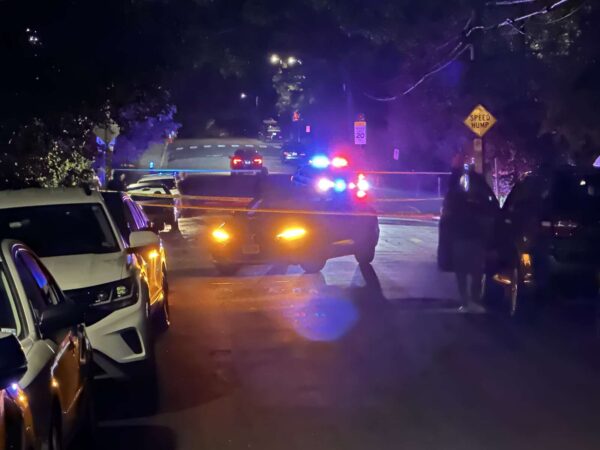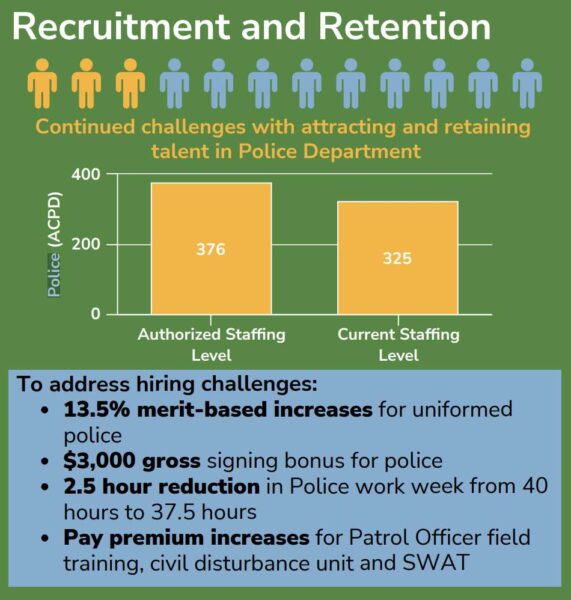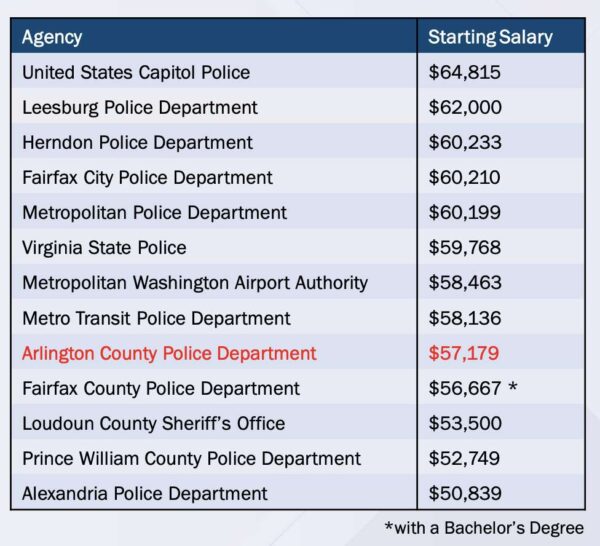
(Updated 4:45 p.m.) Gov. Glenn Youngkin has announced he’s increasing funds to police departments in a bid to reduce homicides, shootings and violent crime in Virginia.
The move, part of a new policy initiative from the Republican governor, will have implications for Arlington police, prosecutors and local restorative justice initiatives.
More than $100 million is slated to go toward state and local agencies to fix wage compression, increase recruiting efforts — including an expedited training program for police officers moving from one department to another — and provide more equipment and training, per a press release.
“The Arlington County Police Department (ACPD) has not been in touch with the Governor’s Office regarding yesterday’s announcement,” spokeswoman Ashley Savage tells ARLnow.
While the impact on ACPD is still hazy, Arlington Coalition of Police President Randall Mason confirms ACPD’s struggles with recruitment, retention and pay compression, which were exclusively reported by ARLnow last year, mirror those highlighted in Youngkin’s announcement.
Although the 2023-24 budget will play “the biggest role” in staffing, he said, Mason projects that Youngkin’s sped-up, eight-week training academy could be a boon, as it would make it easier for officers to switch from Maryland and D.C. departments to Arlington’s.
“Getting more officers onto the street quicker would benefit both officers and the public,” he said. “ACPD could see a significant benefit from the lateral academy depending on what happens in the upcoming fiscal year.”
Of ACPD’s 377 authorized, sworn police officers, 278 are able to provide solo law enforcement services, Savage said. Sixty positions are unfilled and 39 officers are in a training or have light duty status.
The police department’s 16% vacancy rate is higher than almost all of ACPD’s regional competitors and that gap is poised to widen, Mason said.
“We are on pace to lose more officers than we hire for the second straight year, increasing our vacancy rate even further,” he said. “That is in spite of ACPD’s recruitment staff traveling all over the East Coast, up to 400 miles away, trying to find new officers.”

Arlington’s 2022-23 budget includes merit-based increases, signing bonuses and work week reductions to try and address these challenges, but Mason says this doesn’t address another gripe officers have with pay — the county’s pay system.
Unlike other jurisdictions, which reward years of service with set pay increases, Arlington has an “open range” system where officers who have less seniority can end up getting paid more than an officer in their same rank, which is the case for a majority of ACOP members, he said.
“You don’t feel valued for the number of years you’ve been here, when someone who’s been here less time is making more than you,” he said.
Additionally, the hiring challenge comes down to the high cost of living.
“Arlington County is a very expensive place to live and work. Over 60% of ACOP members don’t live in the county,” he said. “It’s ACOP’s opinion that Arlington County’s failure to account for Arlington’s high cost of living is the main explanation for ACPD’s vacancy rate being higher than regional competitors.”

This shortage is hurting officer wellness, said the ACOP president, noting that more than 7,000 hours of overtime were worked in 2021 to get to minimum staffing, and the department is on pace to exceed that number this year.
“Within the last two weeks, ACPD has been involved with two extremely high stress and scary incidents,” he said, referencing the shooting and car chase on Oct. 6 and the officer-involved shooting over the weekend. “Both incidents were handled with the professionalism that Arlington County has come to expect from their police force. Arlington County is asking more and more from our police force with fewer and fewer officers.”
As part of the new initiative, the state will “collaborate with nonprofits like Virginia Law Enforcement Assistance Program to connect [law enforcement officers] with resources to improve their mental and physical wellbeing.”
Operation Bold Blue Line will also work with the state’s retirement system to permit a stop-gap solution for recruitment: allowing retired officers to collect benefits while working in new support roles.
“Departments are often left to turn to retired officers to try to get their staffing numbers up when they’re unable to recruit new officers,” Mason said. “ACPD is in the process of doing exactly that, exploring the idea of hiring back recent retirees to supplement patrol.”
Operation Bold Blue Line also entails hiring a half-dozen prosecutors who can work on local or federal violent crimes cases, as well as two or three group violence intervention coordinators, the Richmond Times-Dispatch reports.
In a follow-up article, the Times-Dispatch reports the office of Virginia’s Attorney General, Jason Miyares, has entered into a memorandum of understanding with Youngkin’s office and the Department of Criminal Justice Services to deploy money from a grant fund that was established to tackle gun violence by supporting Operation Ceasefire Grant Fund — a move questioned by state Sen. Jennifer McClellan (D-Richmond).
This will exacerbate an already problematic prosecutor shortage throughout the state, says the Commonwealth’s Attorney for Arlington County, Parisa Dehghani-Tafti. That the governor appears to be pulling from Operation Ceasefire, which was enacted by the state legislature to allocate money toward combating gun violence, is “really egregious,” she said.
Per state law, the fund managed by Miyares’ office, “shall be used to implement violent crime reduction strategies, to provide training for law-enforcement officers and prosecutors, to provide equipment for law-enforcement agencies, and to award grants to organizations that are involved in group violence intervention efforts.”
Similar efforts have been implemented in Boston, Los Angeles and Richmond.
Using Operation Ceasefire money to hire prosecutors means less money for community-based organizations tackling gun violence, Dehghani-Tafti said. That, combined with the uncertain future of a grant for Arlington’s restorative justice work, is what angers Dehghani-Tafti — a Democrat elected on a progressive prosecution platform — about the announcement.
Not a single word, not a single dollar toward restorative justice, a program that costs a fraction of traditional prosecution while at the same time being far more responsive, respectful, and caring for victims. https://t.co/lS6cfJnNpp
— Parisa Dehghani-Tafti (@parisa4justice) October 17, 2022
Sources who attended a recent meeting of the Department of Criminal Justice Services confirmed with ARLnow that the future of a grant awarded to Arlington in 2021 for restorative justice work is at stake. And this goes back to Arlington County’s decision to transition its restorative justice efforts from a county-run initiative to a community-based nonprofit.
That shift officially took place this year, and required Arlington County to request changes to the grant money it received so that it could be administered by the nonprofit Restorative Arlington. This request had the support of the Criminal Justice Services Board’s Grant Committee, but was tabled in June because of questions some Board members raised.
When the request was revisited last week, sources said a representative for Miyares on the DCJS Board started objecting to this use of funs, saying the grant would not fund a victim-centered program and would instead fund an effort that circumvents the rights of victims to be protected and heard in a court of law.
That’s not how Restorative Arlington coordinator Kimiko Lighty sees it.
“The goal is to give victims of a crime voice and choice in their own healing to meet their own needs moving forward and processing the harm without retraumatizing them by forcing them to do something they don’t want to do,” she said, adding that now, she’s concerned the nonprofit may not be able to spend the funds by the expiration date of June 30, 2023.
“It’s a one-two punch of directing money to pet causes and stripping money from communities that are trying to engage in evidence-based policies,” Dehghani-Tafti said. “This should be a scandal, using the administrative state and grants to undermine communities.”
Arlington’s Chief Public Defender Brad Haywood also criticized the program in a series of tweets.
The U.S. spends more on policing than all but 2 countries spend on their militaries. If more police meant less crime, we'd live in the safest country on earth. https://t.co/sYVmG0oECf
— Brad Haywood (@BradleyRHaywood) October 17, 2022
Although the state has not communicated what the potential windfall for Arlington could be, Savage says ACPD will make that information available as it comes. Meantime, ACPD is going to keep up its efforts to add officers.
“We will follow up on any additional information shared in the future to determine impacts to ACPD,” she said. “We are committed to exploring new and innovative strategies aimed at recruiting and retaining officers to provide professional law enforcement services to the Arlington community.”

